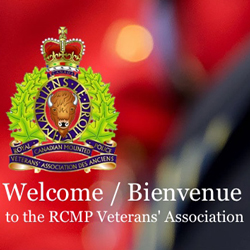Barry Bradley’s Old Newspaper Clippings
Throughout his career in the Force (1960 – 1995), Veteran Barry Bradley developed a newspaper scrapebook containing notable news stories about the RCMP in the Lower Mainland of British Columbia.
Each week, we will post three or four of these old newspaper clippings for the interest of Veterans and their families. This week’s webpage includes some interesting stories reflecting different aspects of activities in the RCMP. These stories would have been forgotten if not saved by Barry and to be shared with others.
OFFICER CLEARED IN 3-CAR CRASH THAT INJURED 4

Photograph of the rear of a RCMP Langley Detachment police vehicle (Source of photo – Sheldon Boles).
June 2, 1984 (Vancouver Sun Newspaper) – A junior RCMP officer was acquitted Friday in Langley provincial court on a Motor Vehicle Act charge of operating an emergency vehicle without out due regard for safety.
Const. Joseph Roy was charged after his marked police cruiser became involved in a three-car traffic accident while running a red light at Fraser Highway and 272 St. in Aldergrove at 11:30 a.m. on April 21, 1983.
Judge Roy McQueen found the officer had activated his cruiser’s emergency lights and siren and had slowed before entering the intersection.
While Roy had failed to observe an approaching care to his right, he did glance to both sides and, as such, did not show disregard for safety, the judge concluded.
The accident caused numerous injuries to four people, including two civilians riding in the backseat of the cruiser.
Roy was parked less than a block away from the intersection investigating a rear-end collision when he received a call to attend yet another traffic accident involving injuries only a few blocks away.
Questioned by defence counsel Jack Harris, Roy said he told the dispatcher he was tied up, but the dispatcher complained no other cars were available.
“She was being a little belligerent, so rather than have an argument I decided to go,” Roy said.
Both drivers involved in the first collision – Kevin Kostuk, 19, and William Sielinski, 21 – were seated in the backseat of Roy’s cruiser filling out accident reports.
Roy told them they were coming along and that they could finish off the reports while he investigated the other accident.
Cross-examined by Crown counsel Richard Miller, Roy said he fastened his seatbelt but did not tell the civilians to do the same.
Asked if the rear belts were located beneath the seat and hidden from the passengers, the officer replied he did not know.
Roy who received his first posting at Langley detachment on Dec. 31, 1981, testified he only injured his palm in the accident, and credited his seat belt with preventing further injuries.
Kostuk, whom Roy ticketed for rear-ending Zielinski, said he was thrown around the back seat and suffered facial scars, a bruised right arm and cuts.
Henry Chaisson, driver of the 1965 Mustang that collided with the cruiser’s right rear quarter panel, was uninjured.
But the Mustang pushed the police cruiser into a third vehicle driven by 21-year-old Christine Duncan. She suffered a cut lip, swollen nose and sore neck and shoulders.
Chaisson testified he consumed two draft beer with friends earlier in the evening and that he was travelling about 50 k.p.h. when the accident occurred.
He later agreed telling police in a statement shortly after the accident he might have consumed three or four beer.
Other witnesses to the accident said Chaisson was doing the speed limit and tried to avoid the police cruiser.
TARNISHED BADGES: Crime Tempts Mounties
June 4, 1984 (Vancouver Sun Newspaper) – WINNIPEG – Temptation, combined with golden opportunity, can drive some police officers to rape, steal, murder or commit other crimes.
“Like everyone else, policemen are human beings,” says Sgt. Fred Ross, an RCMP personnel officer in Winnipeg.
But unlike everyone else, cops who get caught face stiffer sentences and other, more subtle, punishments.
Some of the 55 police officers caught on the wrong side of the law in the last four years in Manitoba say the punishment handed out by the courts is nothing compared with the humiliation of losing a good job and the public embarrassment brought on themselves, their families and fellow officers.
Considering all that, plus the added danger they face from other prisoners if they are jailed, why do they do it?
Ross says police are under constant pressure because they are exposed to the criminal element.
“Probably no other occupation so maximally combines temptation with opportunity than that of a police officer,” Ross said.
“One theory is that they’re the ones who are always dealing with crime and criminals,” he said. “They get the idea from coming into contact with those who commit crimes.”
Ross said some police officers also have the notion they are in charge of the legal process and can get away with committing crimes.
One ex-mounts who asked not to be named, was sentenced to two years in jail for thefts committed while working nights.
“Temptation got the best of me,” the 16-yet veteran of the force said. “It was stupidity, period. But the stress on a person is something else.”
Part of the reason he committed the break-and-enter crimes was to get back at his staff sergeant, he said.
“He was a drunk and a gambler and was looking too bloody good. I wanted to show him what could be done right under his nose.”
In jail, he was in constant fear for his life.
“Twice they tried to cut my throat. A bunch of inmates came up in the middle of the night and grabbed me. You bet it was scary – every inmate in there has a knife.”
Even officers not convicted of the crimes they have been accused of face punishment because superiors are concerned their actions will tarnish the image of the force.
Jeff Oliphant, chairman of the Manitoba Police Commission, said some officers have been pressured into resigning after charges against them have been disposed of by the court.
Oliphant said a case involving a former native RCMP special constable is an example of what can happen.
Joe Kline resigned from the Winnipegosis detachment two weeks before he was acquitted of charges of assault, possession of a dangerous weapon and mischief in connection with a fight at a beach party.
Kline said he was coerced into resigning by two members of the RCMP internal investigation section.
“I made the mistake of resigning,” Kline said in an interview. “Later, I wrote a letter asking them to rescind the resignation. They said: “It’s too late, we can’t do anything.”
In another case, former RCMP constable Terry Willett, convicted of assault and intimidation, is challenging his dismissal from the force before the federal of Court of Appeal in a case expected to be heard this summer.
INQUEST INTO SLAYING: EXAM URGED FOR MOUNTIE

Photograph of the scale of justice statue at the New Westminster Court House (Source of photo – Sheldon Boles).
June 2, 1983 (Vancouver Sun Newspaper) – CHILLIWACK – A female RCMP officer who shot and killed a 21-year-old Chilliwack man during an attempted arrest should undergo an ‘independent psychiatric assessment” and her future assignments should depend on the results of that assessment, a coroner’s jury said Wednesday.
The recommendation was wine of nine made by the jury after it ruled that the death of Edwin Stephen Hepburn, who was shot by Const. Carol Walker, was homicide.
The verdict came after a two-day inquest, during which the jury heard Walker described by other police officers as a respected member of the force and by a girlfriend of the dead man as ‘a real tough lady “who is now considered to be ‘a lady with a licence to kill.”
In a recommendation directed to Chilliwack RCMP Insp. Herman Griemann, the five-member jury urged that
- “Const. Walker be required to undergo an independent psychiatric assessment, the findings of which to be reported to the attorney-general of B.C. and to the appropriate official of the RCMP, with determination of her subsequent duty assignments to be dependent on the outcome of such assessment.”
Walker, a member of the force for seven years, told the inquest she had been beaten to the brink of unconsciousness when she pulled her revolver and shot Hepburn last March 27 after attempting to arrest him.
“He started to hit and hit and hit,” she told the hushed coroner’s court, her voice breaking.
“He knocked my feet out and pounded me to the ground. He was crazy, just violent (and) he heaved me (two to three metres) like a sack of potatoes.”
“I couldn’t fight, I couldn’t do anything (and) I started to black out. He was over top of me, pounding me (and) there was no doubt in my mind he was going to kill me.”
“My hand went down, went into my holster, brought it up, and pulled the trigger. He lifted off and said, “Okay that’s enough,” which surprised me.”
Hepburn, wanted on four criminal charges, including indecent assault and assault causing bodily harm, was sleeping in a car when he was approached by Walker on a country road about 10 kilometres from this Fraser Valley community, following a complaint about a suspicious vehicle.
After the struggle in which the unarmed Hepburn was shot in the chest, he was taken to Chilliwack General Hospital, were he died about two hours later.
Hepburn was with Cara Prachneau, an 18-year-old student described as a “good friend” on his, at the time of the shooting. Walker was treated at hospital for bruises on her head, face and body and released.
In testimony Wednesday, the jury heard:
Prachneau say that Walker had a reputation as a ‘real tough lady’ with a ‘bad reputation.’ She said she is now considered ‘a lady with a licence to kill.’
When counsel for Hepburn’s family asked for Walker’s personnel records, coroner Robert Graham said it was out of his jurisdiction to obtain them. The jury recommended to the attorney-general of Canada that the service record be available to any court conducting an investigation into an RCMP member.
- That RCMP Insp. Dave Mortimer, who headed the investigation, erased what he considered to be ‘irrelevant’ portions of Prachneau’s statement to police. Prachneau said she was told the segments were erased because they were biased against police. The jury recommended that future interviews be transcribed in their entirety. It also recommended that in cases involving the RCMP, an independent investigation body be appointed to conduct the case.
Mortimer admitting that, while Walker was a ‘potential suspect,’ he didn’t send her clothing in for analysis because it wasn’t necessary. Asked if there was blood on her clothing following the fight, he replied that he didn’t know.
- That Walker had in her possession a non-issue 1 1/2 to two-pound metal flashlight, available only in the United States, that another RCMP member said serves as an excellent billyclub. Walker said the metal flashlight is superior to standard issue RCMP plastic flashlights because of superior lighting power. Walker was one of three members in the 50-member detachment with the metal flashlight.
Walker said she hit Hepburn five or six times with it during the struggle. She added that she had used it on two prior occasions. The jury recommended that the flashlight be made standard issue.
- That Hepburn, who wore steel-toed shoes the night of the shooting, had a history of hitting women and assault.
- That, after the shooting, Walker was told by superiors to drive Prachneau back to the station, and that when she argued that she was dizzy and not seeing properly because of the blows and that her glasses were knocked off and couldn’t be found, was told to drive ‘carefully.’
Walker, 5 feet, 7 inches and 135 pounds, told the court she had never met Hepburn prior to approaching the car. She said Prachneau told her he was Ed Hepburn and that she then radioed for a cover car.
She said Hepburn had been drinking and was sleeping at the time and that when he awoke he provided her with phoney identification.
Shel said he “went into a rage” when she told him he was under arrest.
Asked by Terry LaLibrerte, counsel for Hepburn’s mother, Lucille, why she didn’t wait for backup before arresting Hepburn, Walker replied she was afraid he would drive off, as he’d woken up.
She also said she was worried for Prachneau’s safety.
A police radio transmission from that night played to the court showed that Walker knew she was risking a fight with Hepburn if she dragged him out of the car.
“I’ve got Ed Hepburn here,” Walker said on the recording, “and if I wake him the fight will be on.”
He dispatch officer then said, “Hold off Carol. He’s wanted for indecent assault on a male.”
During testimony, Walker also said it is her experience that most young men react negatively to a female police officer arresting them in front of their girlfriends.
“That’s why I was so polite (in arresting Hepburn).” Walker said she did not use any force toward Hepburn until he started striking her.
She also said people are acting much more aggressively toward police these days.
Prachneau said Hepburn passed out in her car and woke up after Walker arrived. She said she heard a “scuffle” but no gunshot, adding: “I didm’t want to get involved, so I looked straight ahead. I didn’t want to look back.”
She said she was aware of Hepburn’s criminal past, but that she hoped he would change.
“He had a lot of anger in him and took it out on other people sometimes. But he was a hell of a nice guy.”
She said Hepburn and Walker knew each other and that Walker was known for taking advantage of her authority.
Other recommendations included:
- That an annual inspection by a qualified firearms inspector of all RCMP service revolvers become mandatory (Walker had testified that her weapon had an extremely light trigger pull).
That, whenever possible, an auxiliary police volunteer accompany the duty officer assigned to each patrol car on regular duty, particularly on night shift. (RCMP Cpl. John Bayliss had testified that the incident would have been prevented entirely if there had been a second officer in Walker’s car.)
- That people being held for questioning in police headquarters or elsewhere, who are neither suspects nor persons charged with any crime, should be held with a view to maximum reasonable comfort and convenience, and be informed of the reasons of any discrepancy from that standard. (Prachneau had said that she was taken to police headquarters and kept there for two hours before seeing anyone.)
- That the Chilliwack hospital consider ensuring that an emergency doctor be on duty at all times. (There was only one doctor on duty the night of Hepburn’s shooting.)
Hepburn’s mother said in an interview following the verdict that she was ‘quite satisfied.’ Hepburn’s sister Jeannette also said she was satisfied, adding “I hope they follow through.”


 September 22, 2014
September 22, 2014 









